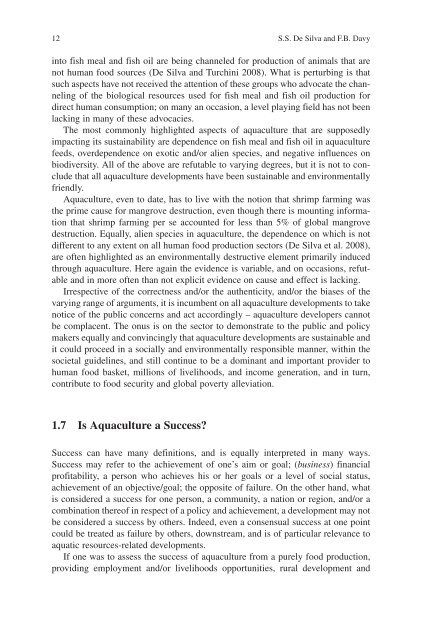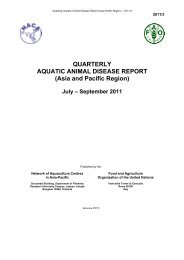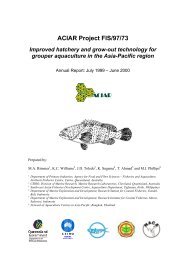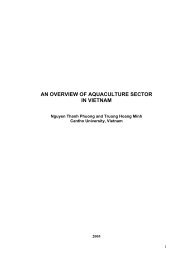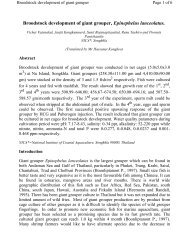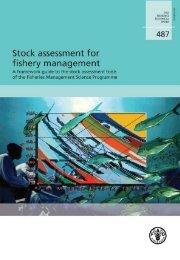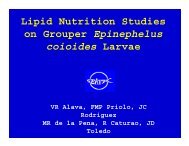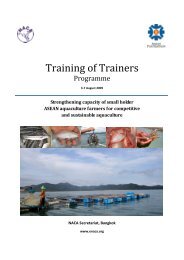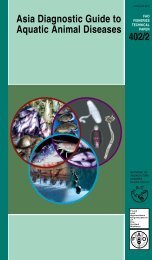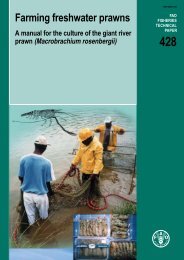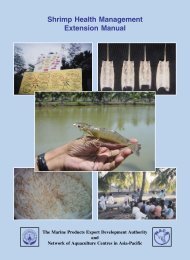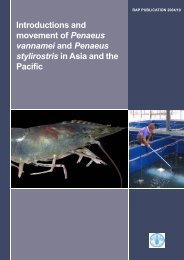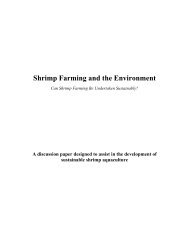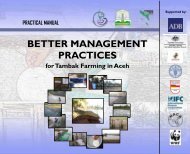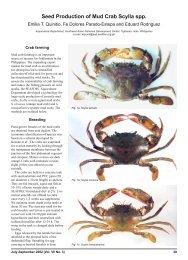Success Stories In Asian Aquaculture - Library - Network of ...
Success Stories In Asian Aquaculture - Library - Network of ...
Success Stories In Asian Aquaculture - Library - Network of ...
- No tags were found...
You also want an ePaper? Increase the reach of your titles
YUMPU automatically turns print PDFs into web optimized ePapers that Google loves.
12 S.S. De Silva and F.B. Davyinto fish meal and fish oil are being channeled for production <strong>of</strong> animals that arenot human food sources (De Silva and Turchini 2008) . What is perturbing is thatsuch aspects have not received the attention <strong>of</strong> these groups who advocate the channeling<strong>of</strong> the biological resources used for fish meal and fish oil production fordirect human consumption; on many an occasion, a level playing field has not beenlacking in many <strong>of</strong> these advocacies.The most commonly highlighted aspects <strong>of</strong> aquaculture that are supposedlyimpacting its sustainability are dependence on fish meal and fish oil in aquaculturefeeds, overdependence on exotic and/or alien species, and negative influences onbiodiversity. All <strong>of</strong> the above are refutable to varying degrees, but it is not to concludethat all aquaculture developments have been sustainable and environmentallyfriendly.<strong>Aquaculture</strong>, even to date, has to live with the notion that shrimp farming wasthe prime cause for mangrove destruction, even though there is mounting informationthat shrimp farming per se accounted for less than 5% <strong>of</strong> global mangrovedestruction. Equally, alien species in aquaculture, the dependence on which is notdifferent to any extent on all human food production sectors (De Silva et al. 2008) ,are <strong>of</strong>ten highlighted as an environmentally destructive element primarily inducedthrough aquaculture. Here again the evidence is variable, and on occasions, refutableand in more <strong>of</strong>ten than not explicit evidence on cause and effect is lacking.Irrespective <strong>of</strong> the correctness and/or the authenticity, and/or the biases <strong>of</strong> thevarying range <strong>of</strong> arguments, it is incumbent on all aquaculture developments to takenotice <strong>of</strong> the public concerns and act accordingly – aquaculture developers cannotbe complacent. The onus is on the sector to demonstrate to the public and policymakers equally and convincingly that aquaculture developments are sustainable andit could proceed in a socially and environmentally responsible manner, within thesocietal guidelines, and still continue to be a dominant and important provider tohuman food basket, millions <strong>of</strong> livelihoods, and income generation, and in turn,contribute to food security and global poverty alleviation.1.7 Is <strong>Aquaculture</strong> a <strong>Success</strong>?<strong>Success</strong> can have many definitions, and is equally interpreted in many ways.<strong>Success</strong> may refer to the achievement <strong>of</strong> one’s aim or goal; ( business ) financialpr<strong>of</strong>itability, a person who achieves his or her goals or a level <strong>of</strong> social status,achievement <strong>of</strong> an objective/goal; the opposite <strong>of</strong> failure. On the other hand, whatis considered a success for one person, a community, a nation or region, and/or acombination there<strong>of</strong> in respect <strong>of</strong> a policy and achievement, a development may notbe considered a success by others. <strong>In</strong>deed, even a consensual success at one pointcould be treated as failure by others, downstream, and is <strong>of</strong> particular relevance toaquatic resources-related developments.If one was to assess the success <strong>of</strong> aquaculture from a purely food production,providing employment and/or livelihoods opportunities, rural development and


